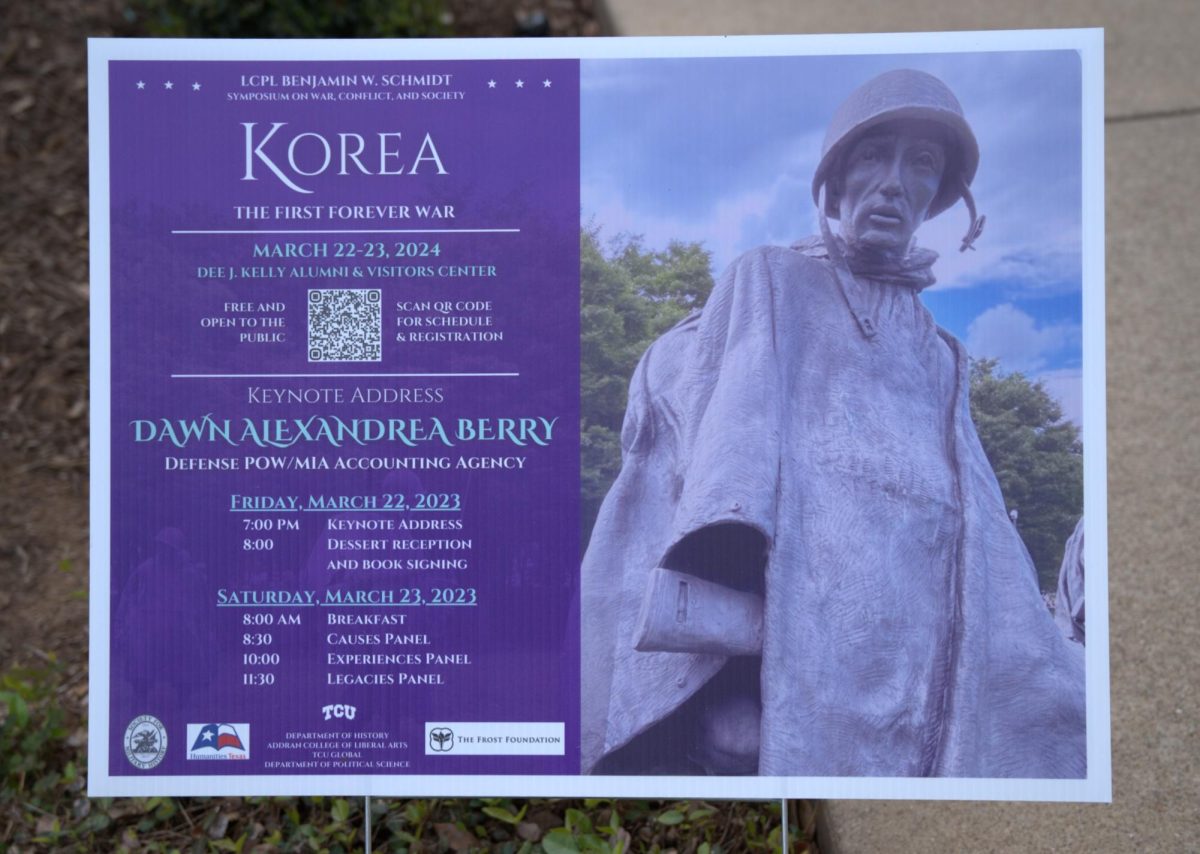Kevin Roney, a senior criminal justice major walked into his Greek history course, The Greek World, and found a seat. But it wasn’t easy.The classroom in Winton-Scott Hall, he said, is made to fit 15 to 20 people, but according to my.tcu.edu, the class currently holds 25 people with five on the wait list.
“It’s tiny,” he said of the classroom. “You’re sitting right on top of the teacher.”
The first day there were not enough chairs for the whole class, he said, but now fewer people come to class, so there is one person to each chair.
“It’s uncomfortable,” Roney said. “I literally can’t move my arms because I’m sitting so close to the person next to me. Luckily she’s a nice person.”
Teachers and students should not have to be packed into classrooms like sardines. When you can smell the person next to you or hear them breathing, they are too close.
Classes should have enough room so students can focus on the teacher without being distracted by their discomfort.
Pat Miller, registrar and director of enrollment management, assigns room requests. He said departments submit classroom requests and they are processed in the order received. When possible, classes are assigned the requested room. But if there is an obvious problem, classrooms assignments are changed.
“We wouldn’t want to put a class of 20 in a room for 60,” he said. “If the class wouldn’t fit in a room, we wouldn’t put them in the room.”
Closed-class permits are the main reason classrooms get overcrowded, he said. Teachers and departments assign closed-class permits without considering the size of the room. Some students on the waitlist also attend courses on the first day hoping they will be enrolled.
If a teacher finds a classroom too small or without resources, Miller said, he or she can request a classroom change. These are given if there are rooms available.
Classes beginning at 9:30 a.m. and 11 a.m. Tuesdays and Thursdays are the worst times and 10 a.m. and 11 a.m. Mondays, Wednesdays and Fridays are also difficult.
Dan Gil, professor of English, teaches an Introduction to Shakespeare course in Winton-Scott Hall. The classroom fits 24 students comfortably, but he has 35 people in his class and one on the wait list. Extra desks line the walls.
Gil does not find this a problem, however.
“I like having it that close … I find there’s more energy,” he said.
Having a small classroom may add energy, but does it make it easier to learn?
The best way for students to learn is in a classroom that fits them – small enough to keep students close but large enough to allow for freedom of movement.
In classes with extra chairs, students are sometimes outside the teacher’s line of consideration. In Winton-Scott Hall, for instance, adding extra chairs increases the already large width of the classroom. Teachers cannot see all students in just a glance but must turn their heads. Teachers often forget to do this and students along the periphery go unnoticed.
To keep classrooms the correct sizes, teachers and departments need to plan ahead. If they know a certain class usually fills up, they should allow a little extra room for wait-listed students and those with closed-class permits. And when assigning these permits, they should consider not just the intimacy of the class – a French conversation class should not have more than 15 students – but also should consider the size of the room. A classroom meant for 24 people should not house 35.
“I am paying a lot to go this University,” Roney said. “But I guess I’m just paying for the piece of paper, not for the classroom I’m in.”
Opinion editor Stephanie Weaver is a senior English, French and philosophy major from Westwood, Kan.





